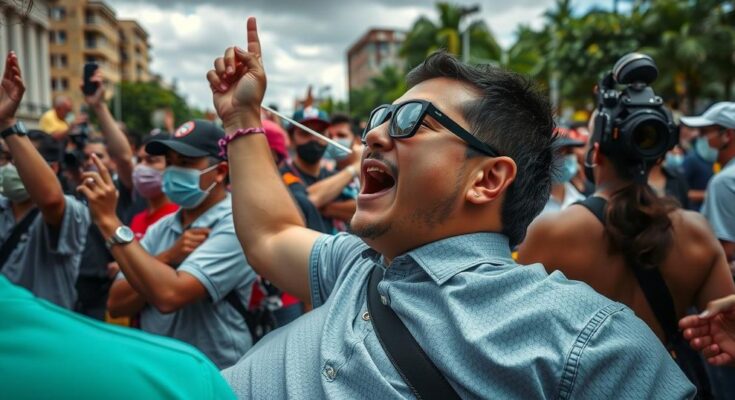Venezuela’s Attorney General announced the release of 146 election protesters, contributing to a total of 1,515 individuals freed post-election. This development occurs as President Nicolas Maduro prepares to take office for a disputed third term amid allegations of election fraud and significant opposition dissent. International support for opposition leader Edmundo Gonzalez grows, raising questions about the legitimacy of Maduro’s presidency as tensions within the country escalate.
The Venezuelan government, led by President Nicolas Maduro, declared the release of 146 individuals previously detained during protests against the government following the contentious presidential election held on July 28. Venezuelan Attorney General Tarek Saab stated that this release is part of a broader initiative, with the total number of detainees released reaching 1,515. This announcement coincides with heightened tensions as Maduro prepares to be sworn in for a contentious third term. Critics allege that Maduro’s reelection lacks legitimacy, citing discrepancies in voting results and a violent response to demonstrations.
The political landscape in Venezuela has become increasingly tumultuous, particularly after the July 28 election, where opposition candidate Edmundo Gonzalez was leading prior to the results being declared in favor of Maduro without transparent vote counts. This has resulted in significant backlash from the opposition, which insists that the election was rigged. Reports indicate that, amidst the protests, around 2,000 individuals were arrested, with claims of 23 fatalities reported by human rights organizations. Compounding tensions, the Maduro government has characterized the opposition’s actions as conspiratorial, further deepening the divide between the two factions.
In a recent development, Gonzalez, who has fled to Spain, is actively attempting to consolidate international support against Maduro’s regime. He is reportedly planning various diplomatic engagements, including a meeting with outgoing U.S. President Joe Biden. The continued recognition of Gonzalez as president-elect by the United States and several other nations underscores the international dispute regarding the legitimacy of Maduro’s presidency. The political climate remains fraught, with the potential for further civil unrest as opposition leaders rally public support against the government.
In summary, the release of 146 election protesters reflects the Venezuelan government’s ongoing attempts to navigate the backlash following the disputed election results. However, tensions remain high, with opposition leaders asserting their claims over electoral legitimacy and planning further actions to challenge Maduro’s authority.
Venezuela has been embroiled in a political crisis for several years, exacerbated by accusations of authoritarianism against President Nicolas Maduro. The July 28 presidential election was characterized by widespread allegations of fraud and irregularities, particularly due to late-night election results that favored Maduro despite opposition claims of a more favorable outcome for Edmundo Gonzalez. The government responded to post-election protests with mass arrests and crackdowns on dissent, drawing international condemnation and further complicating the political situation in the country. With an estimated 20% of the population having fled amid deteriorating human rights and economic situations, the stakes remain high as both domestic and international actors weigh in on the crisis.
The release of 146 protesters in Venezuela marks a significant, albeit contentious, moment in the context of ongoing political struggle in the country. As Maduro’s government strives to assert its authority amidst claims of electoral fraud and widespread dissent, the situation remains volatile. The actions of the opposition, particularly those of Edmundo Gonzalez, suggest that challenges to Maduro’s rule will continue to unfold in both domestic and international arenas.
Original Source: www.aljazeera.com




